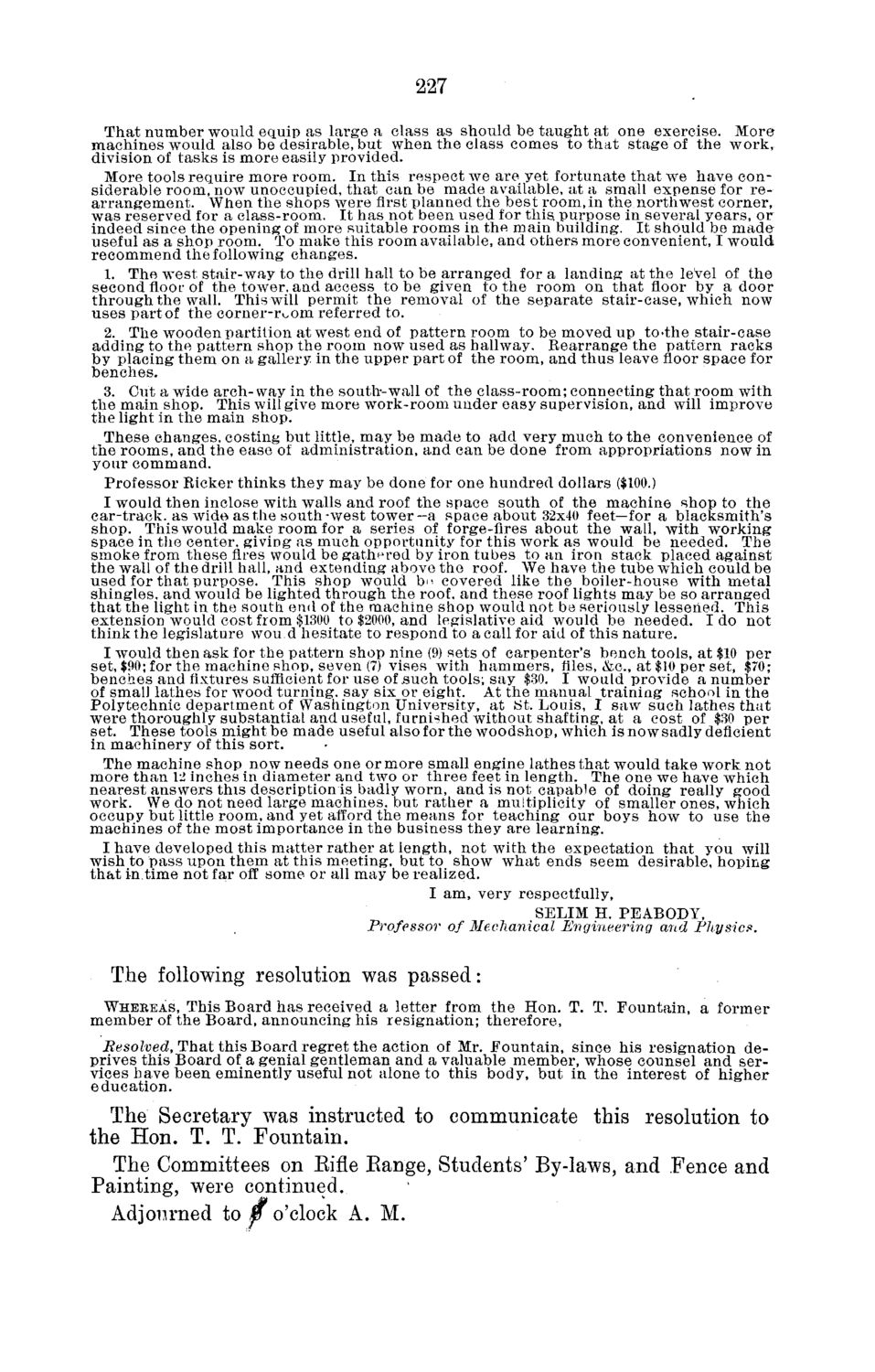| |
| |
Caption: Board of Trustees Minutes - 1882
This is a reduced-resolution page image for fast online browsing.

EXTRACTED TEXT FROM PAGE:
227 That number would equip as large a class as should be taught at one exercise. More machines would also be desirable, but when the class comes to that stage of the work, division of tasks is more easily provided. More tools require more room. In this respect we are yet fortunate that we have considerable room, now unoccupied, that can be made available, at a small expense for rearrangement. When the shops were first planned the best room,in the northwest corner, was reserved for a class-room. It has not been used for this purpose in several years, or indeed since the opening of more suitable rooms in the main building. It should be made useful as a shop room. To make this room available, and others more convenient, I would recommend the following changes. 1. The west stair-way to the drill hall to be arranged for a landing at the level of the second floor of the tower, and access to be given to the room on that floor by a door through the wall. This will permit the removal of the separate stair-case, which now uses part of the corner-r^om referred to. 2. The wooden partition at west end of pattern room to be moved up to>the stair-case adding to the pattern shop the room now used as hallway. Rearrange the pattern racks by placing them on a gallery in the upper part of the room, and thus leave floor space for benches. 3. Cut a wide arch-way in the south-wall of the class-room; connecting that room with the main shop. This will give more work-room under easy supervision, and will improve the light in the main shop. These changes, costing but little, may be made to add very much to the convenience of the rooms, and the ease of administration, and can be done from appropriations now in your command. Professor Bicker thinks they may be done for one hundred dollars ($100.) I would then inclose with walls and roof the space south of the machine shop to the car-track, as wide as the south-west tower—a space about 32x40 feet—for a blacksmith's shop. This would make room for a series of forge-fires about the wall, with working space in the center, giving as much opportunity for this work as would be needed. The smoke from these fires would be gathered by iron tubes to an iron stack placed against the wall of the drill hall, and extending above the roof. We have the tube which could be used for that purpose. This shop would b" covered like the boiler-house with metal shingles, and would be lighted through the roof, and these roof lights may be so arranged that the light in the south end of the machine shop would not be seriously lessened. This extension would cost from $1300 to $2000, and legislative aid would be needed. I do not think the legislature wou.d hesitate to respond to a call for aid of this nature. I would then ask for the pattern shop nine (9) sets of carpenter's bench tools, at $10 per set, $90; for the machine shop, seven (7) vises with hammers, files, &c, at $10 per set, $70; benches and fixtures sufficient for use of .such tools; say $30. I would provide a number of small lathes for wood turning, say six or eight. At the manual training -school in the Polytechnic department of Washington University, at St. Louis, I saw such lathes that were thoroughly substantial and useful, furnished without shafting, at a cost of $30 per set. These tools might be made useful also for the woodshop, which is now sadly deficient in machinery of this sort. The machine shop now needs one or more small engine lathes that would take work not more than 12 inches in diameter and two or three feet in length. The one we have which nearest answers this description is badly worn, and is not capable of doing really good work. We do not need large machines, but rather a multiplicity of smaller ones, which occupy but little room, and yet afford the means for teaching our boys how to use the machines of the most importance in the business they are learning. I have developed this matter rather at length, not with the expectation that you will wish to pass upon them at this meeting, but to show what ends seem desirable, hoping that in.time not far off some or all may be realized. I am, very respectfully, SELIM H. PEABODY, Professor of Mechanical Engineering and Fhysics. The following resolution was passed: WHEKEAS, This Board has received a letter from the Hon. T. T. Fountain, a former member of the Board, announcing his resignation; therefore, Resolved, That this Board regret the action of Mr. Fountain, since his resignation deprives this Board of a genial gentleman and a valuable member, whose counsel and services have been eminently useful not alone to this body, but in the interest of higher education. The Secretary was instructed to communicate this resolution to the Hon. T. T. Fountain. The Committees on Rifle Range, Students' By-laws, and Fence and Painting, were continued. Adjourned to if o'clock A. M.
| |